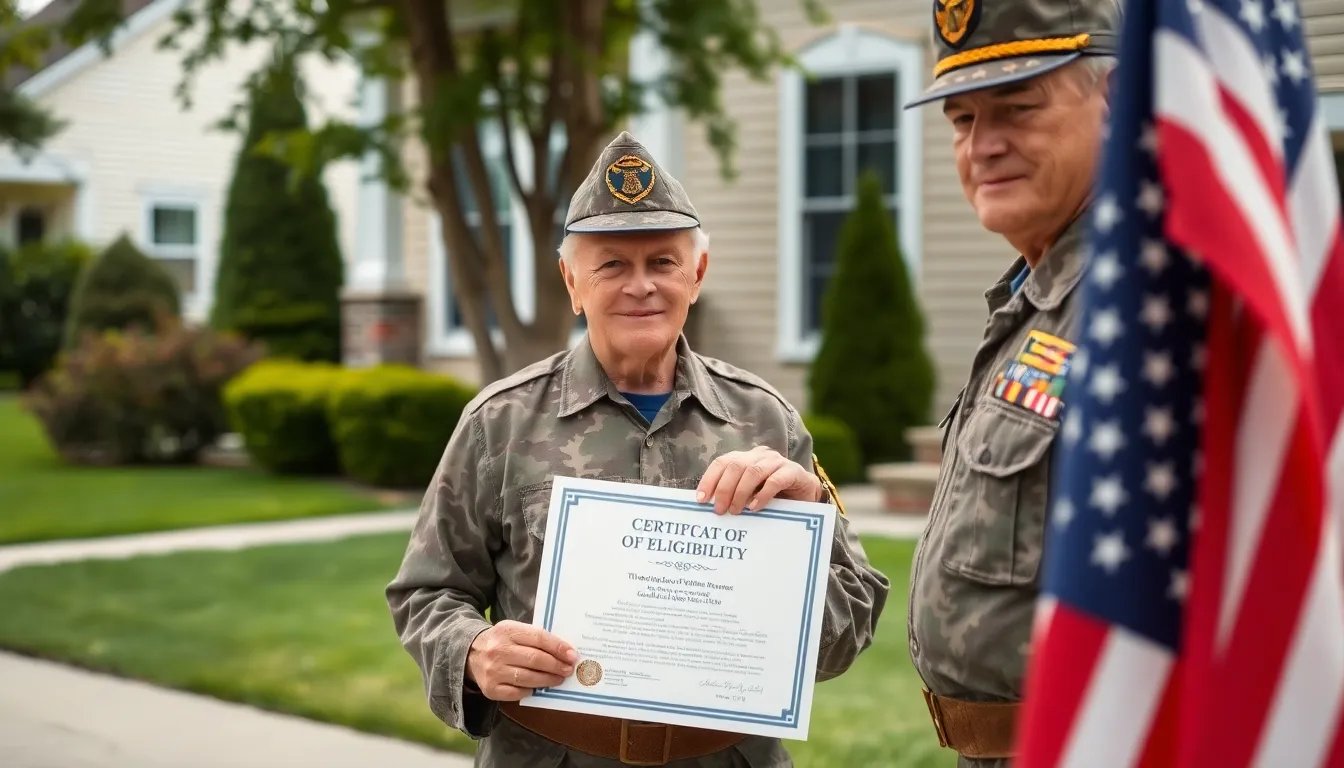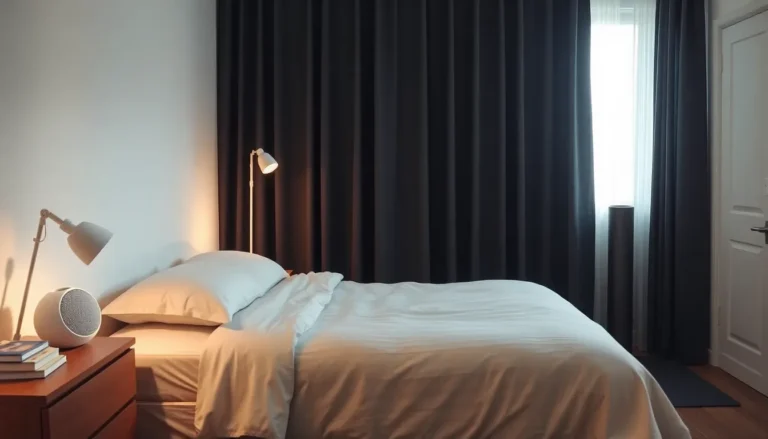For many veterans and active-duty service members, the dream of homeownership can feel out of reach. However, VA home loans offer a powerful solution, making it easier for them to secure financing without the burdens of a down payment or private mortgage insurance. These loans are designed specifically to honor the sacrifices made by those who serve in the military, providing them with unique benefits that traditional financing options simply can’t match.
Understanding the ins and outs of VA home loans is crucial for anyone looking to take advantage of this opportunity. From eligibility requirements to the application process, navigating the world of VA loans can be daunting. Yet with the right information, veterans can confidently embark on their journey toward homeownership, ensuring they make informed decisions every step of the way.
Table of Contents
ToggleOverview of VA Home Loans
VA home loans are specially designed for veterans, active-duty service members, and certain eligible spouses. These loans offer several benefits aimed at easing the homeownership process for military families.
Key Benefits
- No Down Payment: Borrowers can finance up to 100% of the home’s value.
- No Private Mortgage Insurance (PMI): VA loans do not require PMI, reducing overall monthly payments.
- Competitive Interest Rates: Interest rates on VA loans often fall below conventional loan rates, saving borrowers money.
- Flexible Credit Requirements: The program accommodates various credit profiles, enabling a broader range of applicants.
- Assistance for Struggling Borrowers: VA provides resources to help prevent foreclosure, supporting service members in financial difficulty.
Eligibility Criteria
Eligibility for VA loans revolves around service history, with several conditions:
- Length of Service: Generally requires 90 continuous days of active service during wartime or 181 days during peacetime.
- National Guard and Reserve: Members with 6 years of service may qualify.
- Spouses: Surviving spouses of service members who died in the line of duty may also be eligible.
Application Process
The application process for VA loans consists of several clear steps:
- Obtain a Certificate of Eligibility (COE): This document verifies eligibility for benefits.
- Find a Lender: Choose a lender familiar with VA loans to streamline the process.
- Pre-Approval: Obtaining pre-approval helps establish a budget and strengthen negotiation positions.
- Complete the Loan Application: Fill out forms and provide necessary documentation, including income verification and credit history.
- Close the Loan: Final steps include appraisal, underwriting, and the closing meeting.
VA home loans provide a significant opportunity for veterans and military families to achieve homeownership with favorable terms. Understanding the benefits, eligibility, and process helps ensure a smooth journey towards purchasing a home.
Eligibility Requirements

Understanding eligibility requirements for VA home loans is essential for veterans and active-duty service members. These loans cater specifically to distinct groups based on service history and financial qualifications.
Service Requirement
Service members must meet specific service requirements to qualify for VA home loans.
- Active Duty Members: Must complete a minimum of 90 consecutive days of active service during wartime, or 181 days during peacetime.
- National Guard and Reserve Members: Must serve at least six years in the Selected Reserve or have been called to active duty under Title 10 or Title 32.
- Surviving Spouses: Spouses of service members who died in the line of duty or from service-related injuries may qualify without restrictions on the length of service.
Verification through a Certificate of Eligibility (COE) is necessary to confirm service eligibility.
Credit and Income Criteria
Credit and income criteria for VA loans ensure borrowers meet financial standards while providing flexibility.
- Credit Score: While the VA does not enforce a strict minimum credit score, many lenders require a score of 620 or higher for conventional approvals.
- Stable Income: Documentation of consistent, reliable income is crucial. This includes pay stubs, W-2s, and tax returns for the last two years.
- Debt-to-Income Ratio: Most lenders look for a debt-to-income (DTI) ratio of 41% or lower, although some may consider higher ratios with strong compensating factors.
Borrowers should prepare financial documents to demonstrate their ability to manage monthly mortgage payments effectively.
Types of VA Home Loans
VA home loans offer various options to accommodate diverse needs. Each type is designed to provide veterans and active-duty service members with accessible paths to homeownership.
Purchase Loans
Purchase loans enable veterans and active-duty members to acquire homes without a down payment. These loans finance up to 100% of the home’s value, making homeownership more achievable. Lenders typically offer competitive interest rates, and VA loans do not require private mortgage insurance (PMI). Eligibility is determined based on service history, and qualifying applicants can explore various property types, including single-family homes, condos, and multi-unit properties.
Refinance Loans
Refinance loans facilitate the process for veterans looking to reduce their mortgage payments or access home equity. The Interest Rate Reduction Refinance Loan (IRRRL) allows qualified individuals to lower their interest rates without extensive underwriting. Cash-out refinancing is also an option, enabling veterans to borrow against their home equity for other expenses. Both types offer significant flexibility, with many lenders providing streamlined application processes.
Adapted Housing Grants
Adapted housing grants assist veterans with disabilities in modifying their homes for increased accessibility. The Specially Adapted Housing (SAH) grant helps veterans construct or modify homes to meet specific needs, while the Special Housing Adaptation (SHA) grant offers financial assistance for altering existing homes. Both grants aim to enhance independence and improve quality of life for eligible veterans, thus making housing more suitable for their circumstances.
Benefits of VA Home Loans
VA home loans offer several advantages that facilitate homeownership for veterans and active-duty service members. Key benefits include no down payment, competitive interest rates, and the absence of private mortgage insurance.
No Down Payment
VA home loans permit eligible borrowers to finance up to 100% of a home’s value, negating the need for a down payment. This feature significantly lowers the barrier to entry for homeownership, enabling veterans to secure a home without needing to save for years. For instance, a $300,000 home purchase requires no upfront cash, allowing veterans to use their funds for other essential expenses.
Competitive Interest Rates
VA loans typically offer lower interest rates than conventional loans, resulting in substantial savings over the life of the loan. These reduced rates stem from the VA’s guarantee to lenders, which minimizes the lender’s risk. With an average interest rate of 2.75% to 3.25%, veterans may find they save hundreds of dollars in monthly mortgage payments compared to standard financing options.
No Private Mortgage Insurance (PMI)
Veterans utilizing VA home loans do not incur private mortgage insurance (PMI) costs. This insurance, often required for homebuyers with less than a 20% down payment, adds to monthly payments. By eliminating PMI, veterans enjoy lower overall mortgage costs, making homeownership more financially accessible. This can equate to savings of approximately $200 to $300 per month, further easing financial burdens associated with homeownership.
Application Process
The application process for VA home loans involves several steps that help streamline the journey toward homeownership for veterans and active-duty service members. Understanding these steps and gathering the necessary documentation prepares applicants for a smooth experience.
Steps to Apply
- Determine Eligibility: Confirm eligibility by reviewing service history and understanding requirements for VA loans.
- Obtain Certificate of Eligibility (COE): Apply for a COE through the VA online portal or through a lender to verify military service and eligibility.
- Select a Lender: Research lenders that specialize in VA loans, comparing terms and rates to find the best fit.
- Pre-Approval Process: Complete a pre-approval with the chosen lender to assess loan amount eligibility and interest rates.
- Home Search: Begin searching for a suitable home based on pre-approved loan amounts and personal preferences.
- Submit Loan Application: Provide necessary details to the lender, including property information and financial status.
- Closing Process: Coordinate with the lender for home appraisal, underwriting, and final closing steps to finalize the loan.
Required Documentation
- Certificate of Eligibility (COE): Essential for verifying service and eligibility for VA loans.
- Proof of Income: Include recent pay stubs, W-2 forms, and tax returns to demonstrate stable income.
- Credit History Report: Lenders often require a copy of the applicant’s credit report to assess creditworthiness.
- Bank Statements: Submit bank statements from the last 2-3 months to provide a financial snapshot.
- Identification: Provide a valid government-issued ID, such as a driver’s license or passport.
- Property Details: Supply information about the selected property, including its address and listing details.
Organizing these documents early can reduce delays in the application process, ensuring veterans and active-duty members can progress toward homeownership efficiently.
VA home loans offer a powerful pathway to homeownership for veterans and active-duty service members. With unique benefits like no down payment and competitive interest rates, these loans honor military service while easing financial burdens.
Understanding eligibility requirements and the application process is key to navigating this opportunity effectively. By gathering the necessary documentation and knowing the types of VA loans available, veterans can make informed decisions that align with their homeownership goals.
Ultimately, VA home loans represent not just a financial tool but a means to achieve stability and comfort for those who have served the nation.




